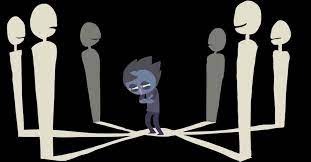Bullying- Effects & Solutions
-By Anirudh Vijayan

So, let’s begin with a hypothetical situation- Consider two people- Jason and me. Jason and I have a complicated relationship. You see, back then, he used to bully me. But lately, I’ve been the one who is making fun of him. I think it’s about time we break that cycle and come to one stand. Bullying is defined by the American Psychological Association as
“a form of aggressive behaviour in which someone intentionally and repeatedly causes another person injury or discomfort.”
I think it’s safe to say that both Jason and I are guilty of this. In the United States, about 20 percent of children between the ages of 12 and 18 reported being bullied at school in 2015, while 16 percent reported being bullied online.
Bullying can take many forms. It can be done verbally through insults, taunts, or threats. Socially, it can be done by affecting someone’s relationships or reputation through rumours or public embarrassment. Physically, it would involve actions that hurt the target or their possessions. Most recently, bullying takes yet another approach through texts, emails, and social media (Cyberbullying). Cyberbullying comes with unique challenges. Because the internet is open 24/7, attacks can come at any time of the day and things posted online – such as pictures, hurtful words, or false profiles – are mostly permanent and public, and can affect college admissions, relationships, or even employment. People who bully usually hold more power than their target through their strength, status, or intelligence. They are typically categorized as either well connected to their peers, concerned with maintaining their social status, or isolated from their peers with low self-esteem.
Most bullies have a lot of friends, but were always afraid that people wouldn’t like some part of them and that their Normal Life wasn’t that great, which is common among kids who bully. They often experience neglect or are themselves being bullied by parents or siblings. Due to this feeling of shame from their own experiences, they might develop defence mechanisms like aggression. Targets of bullying often do worse in school and are more likely to skip or drop out. They are also more likely to experience depression or anxiety, develop behavioural problems, and even begin bullying others. Which is, I guess, what happened to me. I started making fun of Jason to make myself feel better about getting bullied.
Luckily, psychologists have been developing bullying prevention programs that focus on improving school and home environments, which have reduced reports of bullying by as much as 50 percent and kids themselves can help by reporting incidences to adults, not reward bullies for their actions, and make a conscious effort to not bully back. For cyberbullying, there are apps that make the user reconsider sending an offensive message, and other apps which let students report bullying anonymously. Parents can also set boundaries on technology through software and apps that block websites or even alert them when cyberbullying occurs, and it never hurts to be mindful of the things you’re saying online. While these methods are promising, they require active participation from everyone to kids and adults, but if we all play our roles, maybe one day bullying will become a thing of the past.